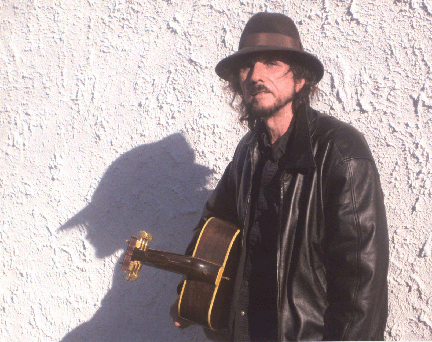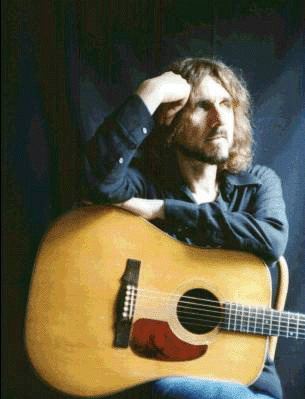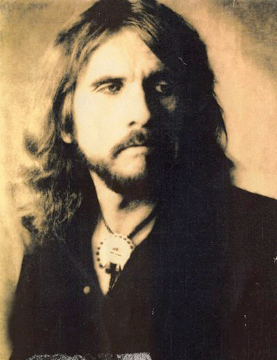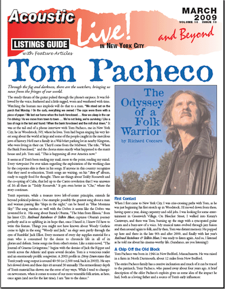Tom Pacheco
The Odyssey of a Folk Warrior
by Richard Cuccaro

Through the fog and darkness, there are the watchers, bringing us news from the fringes of our world.
The steady thrum of the guitar pulsed through the phone's earpiece. It was followed by the voice, feathered and a little ragged, worn and weathered with time. Watching the human race implode will do that to a man.
We stood out on the porch that Monday
On the curb, everything we owned
The cops were there with a piece of paper
We lost our home when the bank foreclosed…
Now we sleep in the car I'm driving
As we move from town to town …
We're not living, we're surviving
Like a box of rags in the lost and found
When the bank foreclosed and the mill shut down."
It was at the tail end of a phone interview with Tom Pacheco, me in New York City, he in Woodstock, NY, where he lives. Tom had begun singing his very latest song about the world at large and some of the people caught in the mercilous jaws of history. He'd met a family in a Wal-Mart parking lot in nearby Kingston, who were living in their car. They'd come from the Midwest. The title, "When the Bank Foreclosed," and the chorus states exactly what happened to the man's house and job. Tom said, "This is happening all over America now."
It seems as if Tom's been reading my mail, more to the point, reading my mind. Every viewpoint I've ever taken regarding the exploitation of the working class by the corporate elite is there in his songs.
If anyone in this country recognizes that they need re-education, Tom's songs are waiting, on his "Best of" album, ready to supply food for thought. There are things about Teddy Roosevelt and the co-opting of Cuba, that led up to the Castro revolution that I was unaware of. It's all therein "Teddy Roosevelt." It gets even better in "Che," where the story continues.
Tom's repertoire, while a treasure trove left-of-center principles, extends far beyond political polemics.
One example: possibly the greatest song about a man and woman passing like "ships in the night," can be heard in "Blue Montana Sky." The song meshes so well with the Dobro it seems like the Dobro was invented
for it. His song about Barack Obama, "The Man from Illinois," from his latest CD, Railroad Rainbows & Talkin Blues, captures Obama's journey perfectly and is so uplifting in its hope that, once I heard it, I knew I'd have to write this feature. Things you might not have known about Woody Guthrie come to light in the song "Woody and Jack," an elegy seen partly through the eyes of Ramblin' Jack Elliot. Every moment of every day supplies material for a man who is consumed by the desire to chronicle life in all of its glories and defeats.
Some songs rise from other's stories. Like a mini-novel, "The Journal of Graeme Livingstone," begins with the demise of Jack the Ripper and travels across the Atlantic and spans several decades. Tom is a voracious reader and an enormously prolific songwriter. A 2003 profile in Dirty Linen states that Tom's yearly song output is around 40-50 (or 2,500 total, back in 2003!). He says he's slowed down and these days it's around 30 annually. The extraordinary depth of Tom's material has shown me the error of my ways. While I tend to champion newcomers, when it comes to some of our more venerable folk artists, as here, once again (and not for the last time), I am "late to the dance."
First Contact
When I first came to New York City, I was criss-crossing paths with Tom, as he was just beginning his first stretch up in Woodstock.
I'd moved down from there, having spent a year, doing carpentry and odd jobs. I was looking for some entertainment in Greenwich Village. On Bleecker Street, I walked into Kenny's Castaways, and there was Tom, burning up the stage with a syncopated guitar strum and a buzz-saw of a voice. My musical tastes evolved through jazz fusion and then around again to folk, and by then, Tom was distant memory. He popped up here and there in the late 90's and after 2000, and finally with last year's Railroad Rainbows & Talkin Blues,
I was ready to listen again. And so, I listened as he told me about his cinema-worthy life. (Sundance, are you listening?)
A Chip Off the Old Block
Tom Pacheco was born in 1946 in New Bedford, Massachusetts. He was raised in a farm in North Dartmouth, about 12 miles from New Bedford. The entire Pacheco family has a creative inclination and much of it can be
traced to the patriarch, Tony Pacheco, who passed away about four years ago. A brief description of the elder Pacheco's exploits gives us some idea of the impact he had, both as a loving father and a source of Tom's early
influences:
Tony was a brilliant jazz guitarist who had gone to pre-WWII, Nazi-occupied France at age seventeen. He played guitar alongside the legendary Gypsy jazz guitarist Django Reinhardt, then slipped out of the country. He joined the U.S. Army six months before Pearl Harbor, and was both an entertainer and infantryman. He was in the invasion of North Africa, Sicily and Naples, and was then transferred back to England. In June 1944, as part of the invasion of France, he and the troops marched straight to Paris where he saw Django again and they jammed together. After the war, Tony returned to the United States to raise a family and open a music store, where he also taught guitar. When Django later came to the United States to tour with Duke Ellington, Tony touched base with him again. Consequently, when Tom was three years old he saw his father play with Django. Later, the apple did not fall far from the tree.

First Steps
Tom's early inclinations toward music began with 50's rock 'n roll. Although he had studied both Flamenco and
classical guitar, he got an electric guitar at 10 or 11 years old and began playing rock 'n roll. He heard people like
Chuck Berry, "a great storyteller," Jerry Lee Lewis and Ricky Nelson. In seventh grade he put bands together.
They played mainly instrumentals at high school dances: guitar-rock stuff pumped out by Duane Eddy, Link Ray
and The Ventures. The first song he ever sang, probably at around 12 years old was a story song, "The Battle of
New Orleans." "I've always loved story songs," he says.
The folk influences started when his father's friends would bring albums with them from New York City. He got to listen to records by Woody Guthrie, Cisco Houston and Leadbelly -- also Bob Dylan's first album on Columbia.
That was the end of his rock 'n roll aspirations for a while. He began going to a coffeehouse in New Bedford called Triworks to see folksingers there. He started writing songs at age fifteen and would hitchhike 60 miles to Boston and 60 miles back and be in high school the next day. He met people like Patrick Sky, Bobby Neuwirth, Dave Van Ronk, "great folk people," he recalls. He saw Phil Ochs a number of times in Boston and was in the audience at Newport when Dylan went electric and remembers the workshops with Pete Seeger and Buffy Saint-Marie. Although he recorded an album called Turn Away From the Storm when he was 16-17 (It came out when he was 19), he never played in New Bedford -- "I wasn't very good at sixteen years old," he says.
Hendrix, Baby James, Jerry & Arlo
The whole folk-rock thing started around 65-ish or so… bands like the Byrds following Dylan. In 1966, at the age of nineteen, Tom moved to Greenwich Village. There, the stories really begin to pile up. It was the heady days of
the great folk and folk-rock boom. Peter, Paul and Mary had achieved huge success and Dylan had already gone electric.
There were 30 or 40 clubs, or [pass-the-hat] "basket houses" in Greenwich Village. He remembers Joni Mitchell playing to six people, before she became famous. At a place called the Tin Angel, a restaurant, upstairs from the
Bitter End, one particular day, he sat with Dave Van Ronk, Eric Andersen, Joni Mitchell and "maybe David Blue."
As he recalled it, "Joni was ecstatic because she'd just heard that Judy Collins had recorded three of her songs, including "Both Sides Now." He met Arlo Guthrie and would go over to the Gaslight while Arlo was writing "Alice's Restaurant."
"It was a short song when when he started it," Tom says "He kept adding to it and adding to it. I loved to hear the additions. Some great verses never made it into the album."
Tom formed his own folk-rock group, The Ragamuffins when he got to Greenwich Village. At Cafe Wha, they opened for a group called Jimmy James and the Blue Flame. "Flame" indeed! Jimmy James, in actuality, was Jimi Hendrix.
The Ragamuffins were: Tom, his brother, Paul on bass, a cousin, "Scratch" on drums, Sharon Alexander and Kenny Pine (who later played with the Fugs). They later had a 5-month residency at Night Owl Cafe, playing 6 nights/week. There were three bands each night. One of them was The Flying Machine (James Taylor, their songwriter), The other was The Lost Sea Dreamers (AKA Circus Maximus, Jerry Jeff Walker, their songwriter). Tom would hear James working on new songs. He especially remembers "Brighten Your Night With My Day." He also recalled that Circus Maximus later turned down Jerry's "Mr. Bojangles" for inclusion on their album. Brilliant move, guys!

Tom lived for a while with Sharon Alexander at the Albert Hotel. He liked to do his songwriting all night (and still does). Because he didn't want to wake Sharon up, he'd ride the old freight elevator to the basement. He had to squeeze through tight crawl spaces to a center room where he would write until 6am. Huge cockroaches by the thousands inhabited the basement, making his passage there more than uncomfortable. They'd scatter when he turned the light on. [The author knows from personal experience, the way they also drop from overhead -- are we squirming yet?] Now, that's dedication.
Tom would have been a stalwart of the resurgent Fast Folk movement in the late 70's and early 80's if he'd stayed around.
Right as Tom was leaving the Village for Woodstock (then later, Texas, Nashville and Ireland), a group of songwriters would gather at The Cornelia Street Cafe to critique each other and eventually record their music. Before that, however, Tom's apartment at 117 MacDougal Street was the first place the Fast Folk crowd would gather to play. The list includes Jack Hardy, The Roches, Rod MacDonald, David Massengill, and Steve Forbert. Tom stayed up late and everybody came through there. He heard all their new songs. One night Roger McGuinn came by to play "Chestnut Mare," a classic Byrds song. Another night in January, 1976, writer Larry "Ratso" Sloman, brought Phil Ochs over. Phil had already gone through a severely depressed episode. He picked up Tom's guitar and asked if he could play a song, asking Tom what he'd like to hear. Tom requested "Pleasures of the Harbor." Phil, appearing eerily calm and quiet played it. He said, "Inspiration used to strike. It doesn't strike any more." Soon afterward, in April, he hung himself. Tom was shattered.
Ex-Animals bassist Chas Chandler had coaxed Jimi to England and helped him form the Jimi Hendrix Experience. While there, Jimi helped to get airplay for a single by the Ragamuffins, "Four Days of Rain" on pirate radio. There was Radio Luxembourg and there was Radio Caroline, a ship anchored two miles off the English coast. These were the only places rock 'n roll (Beatles included) got played. When he tours England, Tom still gets the odd (and un-accomodated) request for "Four Days of Rain."
He formed a band with three other folksingers (Sharon included) and made an eponymous album, Euphoria. Later, Tom made an album for Columbia with Sharon, Pacheco and Alexander produced by a pre-Orleans (now Congressman) John Hall.
The duo split up after the album, later considered a "gem of Americana," did not meet with success. Although Tom didn't make another album for the next five years, he continued to write and his work was recorded by others. Richie Havens included an early version of Tom's "Indian Prayer" on Mixed Bag II and Tom wrote Jefferson Starship's hit "All Fly Away" which was also the title song of the group's Dragonfly album. Several more of Tom's songs found their way into the Starship's repertoire. He was then signed to RCA and worked with the legendary George "Shadow" Morton on The Outsider and
Swallowed Up in the American Heartland. Both came out in 1976. Tom calls Shadow "The James Dean of Rock 'n Roll."
A picaresque figure, Shadow would walk down 42nd Street with a white cane that had a long blade inside of it, ready for any kind of trouble. He wrote "The Leader of the Pack" and created the girl group, The Shangri-las and produced Janis Ian's "Society's Child." Extremely eclectic, during the time he produced Tom's albums, he was also producing The New York Dolls.
Together, Tom and Shadow spent three days aboard a coast-to-coast train, headed for L.A., where production would take place.
They got to know each other, talking and gambling their way westward. The albums came out in March and November. For the next album RCA insisted on something more commercial, including innocuous love songs. Tom wouldn't knuckle under.
There would be no more "proper" studio album for 13 years. In 1986, an album with his rock band, "The Hellhounds" was made live at a notorious roadhouse, Uncle Willy's, in Kingston, New York. In the interim, from 1978 to '84, he lived in Austin, then from 1984 to '86 back in Woodstock and then spent a year in Nashville (no way was he fitting in with those folks).
In 1987, not caring for the direction America was taking (it was the Reagan years, folks,) he headed off to live in Ireland. For the next 10 years, he toured Europe and made six albums: Eagle In The Rain (1989), Sunflowers & Scarecrows (1991).
Tales From The Red Lake (1992). Big Storm Comin' (1993), Luck Of Angels (1994) and Bluefields (1995). A couple of the albums were actually recorded in Nashville, but for the most part, Tom steered clear of America. He made a close friend in Steinar Albrigtsen, a Norwegian. Steinar sang and played on two albums and produced a third, Bluefields. Near the tail end of his 10 years in Ireland, Tom had reflected that although he'd made recordings on European labels and even recorded in Nashville, he hadn't seen Woodstock in 11 years. He wanted to make an album using all Woodstock players, maybe get 1 or 2 members of The Band on one song. He sent a tape of 12 songs to Jim Weider, the guitarist who replaced Robbie Robertson.
Weider showed it to Levon Helm. Levon, Garth Hudson and Rick Danko said they wanted to back Tom on the entire album.
Tom and his wife Annie flew from Ireland to Newark (NJ) airport and were surprised to find a long white limo waiting for them, arranged by The Band. They cut Woodstock Winter in 5 weeks over the winter of '96. It came out in '97. Tom was signed to Polygram, and the album came out on Mercury in the United States.
Tom went back to Ireland, but events conspired to draw him back to America. Five months after they finished Woodstock Winter,
The Band showed up for a European tour. They played with Tom at one of his gigs. Tom moved back to Woodstock in 1997, primarily to be near his parents, but also to work with his friends in The Band. He states: "When I moved back here at the end of '97,
I wasn't going to do any shows in America, ever. I was only going to live here and tour Europe, fly over to Italy for two weeks, Scandinavia for three weeks, Holland, Switzerland, Germany… I didn't think anyone would remember me. I had gone through a long period of playing in rock bands. It was Rick Danko who said, 'Tom, you gotta start playing in America. I want you to open
up my next ten shows, to get you going.' And I did. We'd travel together. I'd do a 45-minute set. Then he'd come on and do an hour, hour and a quarter, then both of us would close the show with my song "Hills of Woodstock." Then, I started to play and have been drawing good crowds."
While visiting Levon Helm, Tom discovered a box full of tapes of songs that other artists wanted The Band to record. Levon was too upset about his trials with Robbie Robertson over song rights to want to record other people's work. Tom decided to give the band co-credit on all the songs in his next album. His reward was that, later, they recorded their own versions of his songs and he
loved what he heard. Two of his songs were on The Band album Jubilation. Rick Danko's last album, released posthumously (he died of a hear attack in 1999), included two of Tom's songs.
In subsequent years, Tom's albums included: Bare Bones & Barbed Wire (1998), The Lost American Songwriter (Bare Bones II) (1999),
Nobodies (2000) (with Steinar Albrigtsen), There Was A Time (2002), The Long Walk (2004), Rebel Spring (2005) Bloodlines (2006) and in 2008, Railroad Rainbows & Talkin Blues,
The Bare Bones albums are 34 and 30 track monsters, illustrative of how prolific Tom is. Pete Seeger plays on There Was A Time and is a close friend to Tom.
As listed below, Tom is playing an early evening show in Riverdale on May 3rd and then will head down to Pete's 90th birthday celebration at Madison Square Garden, where he will perform "Indian Prayer."
There is a mountain of great Pacheco songs for American listeners to discover (or re-discover). Tom's work deserves heavy airplay.
There are a lot of progressive shows being broadcast or streamed and they would benefit from sharing his work with listeners.
The sampling that this author has collected from the decades of Tom's career show consistently high production values. The rockers burn hotly and the ballads are achingly beautiful. One song in particular comes to mind here.
The song "Butterfly," from the album There Was A Time, was written for tree sitter Julia Butterfly Hill who lived in a redwood for two years in order to save it. This one will produce a lot of moist eyes.
Tom's care and concern for nature and the human race continues to drive him. He continues to produce great songs at an astonishing pace.
One of his new songs deals with how the textile mills in New England moved to North and South Carolina in the late 50's where wages were
cheaper and then were moved to the Mexican border, and then to China. It will end in the last verse when they come back to New England where
the wages will be the lowest in the world."When the bank foreclosed" came out of this same area of concern. Tom states: "That's what songwriters
do. They chronicle their times. As part of their work, anyway."
I suggested that Woody Guthrie had left the folksinger genre in good hands. He responded, "He was always one of my idols."
Tom is definitely one of "Woody's Children."
Tom summed up his sense of purpose at the end of our interview: "I never wanted to get rich out of this. All I want to do is pay my mortgage and my taxes, have food on the table and heat. I've never wanted more than that, ever. Just to live like anyone else, write and sing my songs and have other people record them."
Those of us who recognize how important he is will do what we can to ensure that Tom gets what he needs. In the process, America might just get the same.
Web site: www.tompacheco.com

